What's Wrong with Doctor Who
Educational Program Cinema / / December 28, 2020
On January 13, the third episode of the 12th season was released on the BBC (in Russia - on KinoPoisk HD).Doctors Who"Entitled" Orphan 55 ". The ratings for this episode were horrifying. On the IMDb website he received Orphan 55 the lowest score in the history of the series - 4.6.
Shortly after the episode was released, oddities began on the aggregator site Rotten Tomatoes: viewership ratings began to fall for the whole new season, after which the numbers simply disappeared. At first, the service was suspected of deliberately deleting the ratings, but then they blamed everything on a mistake, since the reviews for the sixth season also disappeared.
Dr. Who nukes all its user reviews prior to today (Jan. 12th).. due to ratings being in the low 30% s? Is now accepting new user reviews, and they're still dismal!! @Nerdrotics
They reset the score! _! pic.twitter.com/KjRvcXDJFQ- Sheila Allen 👽 (@Sheilaaliens) January 12, 2020
However, things only got worse as a result, as the new ratings were even lower and as of this writing, the rating for the entire season has dropped.
Doctor Who: Season 12 up to 16%, which is almost nonsense for a popular project. And the third episode even from the critics Orphan 55 only 58% against the background of very high ratings of almost all previous series.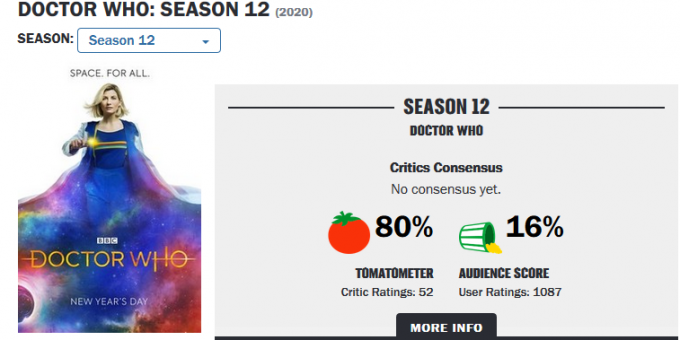
And at the same time the season, and so opened Doctor Who Season 12 Opens With Lowest Ratings In Years with the worst ratings in years, loses with every episode Doctor Who Ratings Plummet: Loses Near Million Viewers approximately 300 thousand spectators. All of this hints at a real Doctor Who crisis.
However, these troubles did not appear suddenly. We will tell you why the project has been heading towards disaster for several years.
Warning: the text contains spoilers for all seasons of Doctor Who.
How the series developed
The science fiction series Doctor Who was launched in 1963. Its plot is dedicated to an alien from the Time Lords race. He calls himself the Doctor and travels in a TARDIS car across different worlds and eras, saving everyone from danger. Most often, earthlings become his companions.
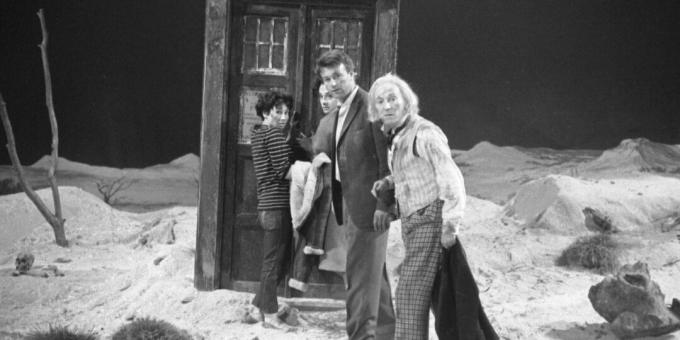
For many years, the project was successfully broadcast on television, many popular writers worked on it (in particular, the famous Douglas Adams), and the idea that the Time Lords could regenerate by changing their appearance allowed the creators to change the performers of the main roles.
But gradually the ratings of the series began to fall, and in 1989 the project was closed. In 1996, a full-length film was released, but in the form of the series "Doctor Who" restarted only in 2005, under the leadership of Russell T. Davis. Over the years, the new version, which could be watched even without being familiar with the original, gained immense popularity. And the tenth performer of the role of Dr. David Tennant was even recognized as the best actor in this role of all time.
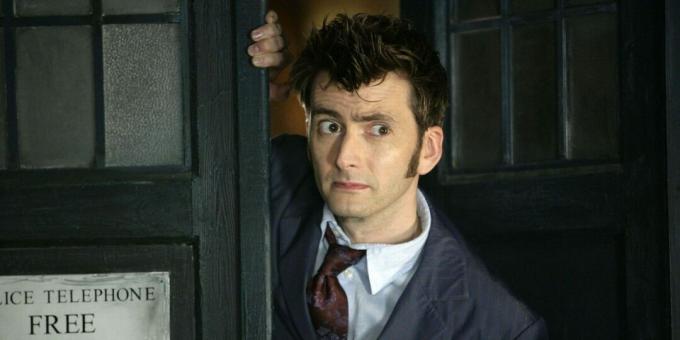
After Davis left, Steven Moffat took over with the entire team after the fourth season. In his version, the Doctor, now played by Matt Smith, became more fussy, began to make strange jokes and gesticulate a lot.
The first seasons under the leadership of Moffat are also considered one of the most successful thanks to the many unexpected turns and bright companions of the Doctor.
But soon the series began to have problems: the director was clearly tired, and with each season the interest in the project was falling. Neither the change of the leading actor (the middle-aged Peter Capaldi became the new Doctor), nor the attempt to "soft restart" to attract new viewers helped.
When Stephen Moffat left the project, he was replaced by Chris Chibnell, who became famous for his work on the detective "Broadchurch». He first decided to make the Doctor a woman, inviting Jodie Whittaker for the lead role, and at the same time giving her three companions at once.
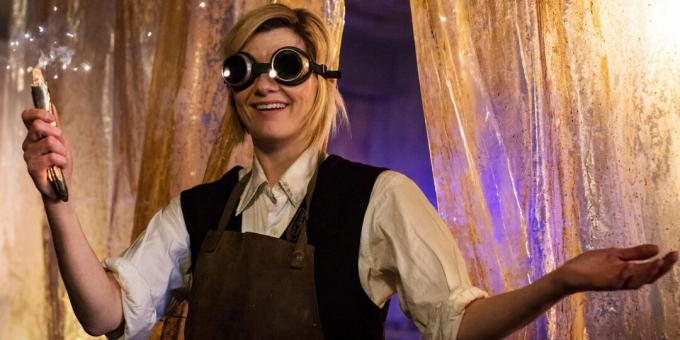
But, unfortunately, the shortcomings that appeared under Moffat only intensified with the arrival of the new team.
What problems did Doctor Who have?
Cruelty and self-repetition
The first thing many viewers noticed was that the stories in Doctor Who became more violent. In the first season, even in the episode set during World War II, the Doctor joyfully proclaimed: "Nobody dies today!" Now the death of an episodic character has become an obligatory attribute of every plot. And sometimes they are exterminated by almost dozens, in order to immediately forget.
The very name of the Doctor was originally a symbol of hope and salvation: he could not destroy even the last distant, even though he was his eternal enemy, and did not take up arms, calling himself “a man who never will kill. " But gradually the character regularly began to turn into a formidable warrior, who is feared by entire civilizations, and in the 12th season the Doctor boldly threw a grenade at his enemy.
The fifth and sixth seasons, where Moffat began his work, adhered perfectly due to the chemistry between the Doctor and his companions Amy (Karen Gillan) and Rory (Arthur Darville), as well as the regularly appearing River Song (Alex Kingston). But the plots gradually began to change. If earlier most of the stories were associated with aliens and an external threat, then over time everything became fixated exclusively on the Doctor himself.
As a result, the series came to the classic scheme: if there were no hero, there would be no problem.
They began to devote more and more time to the personal experiences of the characters. And as the dangers that the heroes had to cope with, Moffat tried to take more and more relevant topics: Wi-Fi, emoticons that determine the mood, or rooms with hidden fears.

In addition, self-repetition was becoming more noticeable: fans were accustomed to regularly returning to the series. classic villains like the Master or Daleks, but Moffat used crying angels three times, restored Silence and other enemies. Each coup was repeated at least two times, which clearly hinted at a crisis of ideas.
Uninteresting satellites
After Amy and Rory disappeared, the Doctor has a new companion, Clara Oswald (Jenna Coleman). The first episodes with her were successful, and she became a rare example of a companion who stayed with the Doctor after regeneration.
But gradually it became clear that Clara's story was almost not developing. Previously, the characters of companions changed under the influence of the Doctor and adventures. But the line of this heroine reached its climax after the first season. It turned out that she was following the main character from the very beginning of his story.
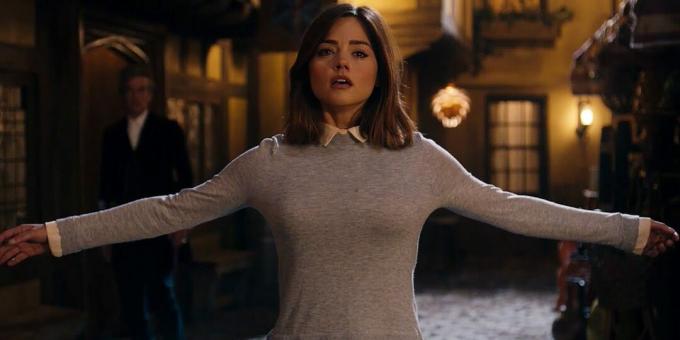
But after that she remained the Doctor's companion for two more seasons, and during this time nothing new was told about the character. Already at this time, the ratings of the series began to fall significantly, and Moffat made several attempts to interest viewers: the bright and charismatic Missy, the female version of the Master, was introduced into the plot, and then they made a “soft restart ".
There was a huge break in the Doctor's adventures, and Bill Potts (Pearl Maki) replaced Clara. But this heroine was given only one season for development, besides, she was often lost for the more charismatic Missy (Michelle Gomez) or the comedic Nardol (Matt Lucas).
And after the arrival of Chibnell, the companions did become too clichéd: the middle-aged bus driver Graham (Bradley Walsh), who had lost his wife; his dark-skinned grandson Ryan (Tozina Cole) with dyspraxia; and police girl Yasmin Khan (Mandip Gill), who is not taken seriously at work.
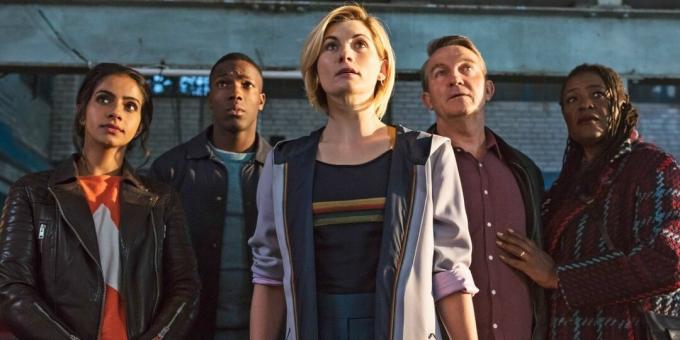
All the characters are chosen so as to initially evoke empathy in the viewer. But the trouble is that there are too many of them, so the characters are not given enough time. And even fewer opportunities remain for the Doctor himself to open up.
Replacing science fiction with social issues
With the arrival of Chibnell, the plots and, oddly enough, the scene became more monotonous. As you know, the TARDIS can travel to any point in space and time. But for some reason the heroes remain on Earth in almost all episodes.
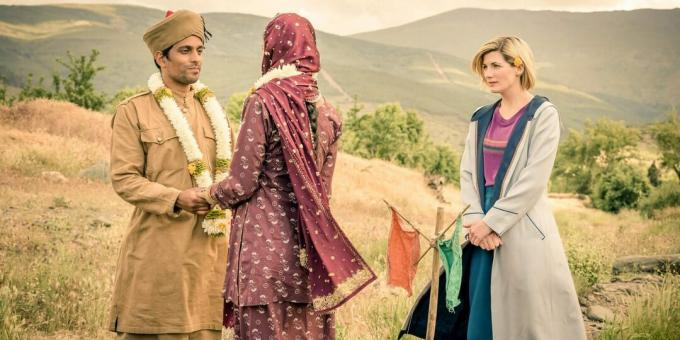
They just find themselves in different times, where the audience is shown socially important events: the beginning of the fight against racial segregation in the United States, the division of India and Pakistan, the witch hunt in the 17th century. "Doctor Who" has often featured real personalities and important historical events in the past, but more often than not they were mixed with the antics of aliens. Now the aliens, like the heroes, periodically turn out to be only observers.
And even fictional stories clearly hint at social themes: what is one hotel chain owner who dreams of becoming the president of the United States. Moreover, it is surprising that the series often hints at American problems, despite the fact that it is filmed in the UK.
Aliens and all kinds of fiction fade into the background, and human problems are at the center of the plot every time.
And it reaches its apotheosis just in the series "Orphan 55", where the heroes seem to arrive on another planet, but it turns out that this is the Earth of the future. And the Doctor strangely does not recognize her.
Even the Christmas episodes have disappeared - usually the lightest, based on classic fairy tales, filled not only with fantasy, but also magic. Dissatisfaction with this was expressed David Tennant Isn’t Happy Doctor Who Stopped Christmas Episodes even David Tennant and Matt Smith.
Changing the role of the Doctor
In contrast to Moffat's problems, where the whole plot was tied only to the main character, Chibnell's last Time Lord often has little influence on what is happening.
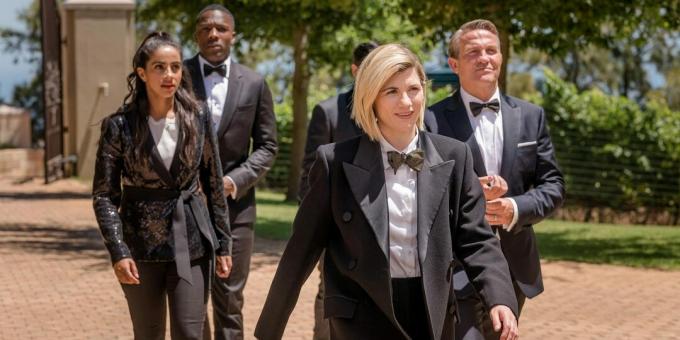
She follows the already designated historical events, tries in every possible way not to interfere and only explains something to her companions. Increasingly, important actions are shifted from the main character to her companions.
In the episode about the partition of India, you can completely remove the Doctor's line, and the essence of the series simply does not change: it’s a good drama.
Many initially cited the woman in the role of the Doctor as the reason for the failures of recent seasons. But in fact, this does not at all contradict the idea of the series: the Time Lord can regenerate into anyone. But most importantly, Jodie Whittaker knows how to play well and falls well into the character. But they hardly let her play.
The doctor does not even reveal his past to his companions. After a whole season, she only once remembers Galifrey, and then with the help of the Master. If classic enemies return, then they do not for long, and even the famous sonic screwdriver is used less and less.
Deceived expectations
Season 11 of Doctor Who - the first to be directed by Chibnell - received very low ratings from viewers. However, critics still praised him, and some of the fans still had hope that the series would return to its usual course. And at some point there was a feeling that the new season would be closer to the classics: in the New Year 2019 edition of the year showed the Daleks again, and the two-part start of the 12th season surprised with twists and in an unexpected way Masters.

But as a result, the action was still reduced to social themes. The doctor, together with the satellites, never left the Earth, apparently, he will not do this in the future.
It seems that the situation will not improve in the near future. In the 12th season, viewers are introduced to the first programmer Ada Lovelace, the inventor Nikola Tesla, by writer Mary Shelley. And only somewhere in the background looms the whole universe and other times, where the heroes could go.
What is the result
Strictly speaking, the episode "Orphan 55", which became a vivid reflection of the crisis of the series, is not so worse than all the other episodes. They just tried to fit a completely unreasonable amount of drama into it, packing it into an important social message about preserving the climate.
But after a hopeful start to the season, viewers again saw what they had already grown tired of in recent years. And if the authors of "Doctor Who" do not change anything, the ratings will continue to fall.
It remains only to believe that the series, like the main character, will once again regenerate into something new, and after another unsuccessful season, viewers will once again be shown bright and witty stories and adventures in outer space. It's not for nothing that Doctor Who has existed for more than half a century.
Read also📺🎞🎬
- 10 TV series that will replace "Game of Thrones"
- 13 of the most striking fantasy TV series
- Fantastic Time Travel: What to Expect in Stranger Things Season 4
- The Undo series: you've never seen such a combination of fiction, drama and detective
- Why Dark Beginnings is the Most Promising Fantasy of the Year



